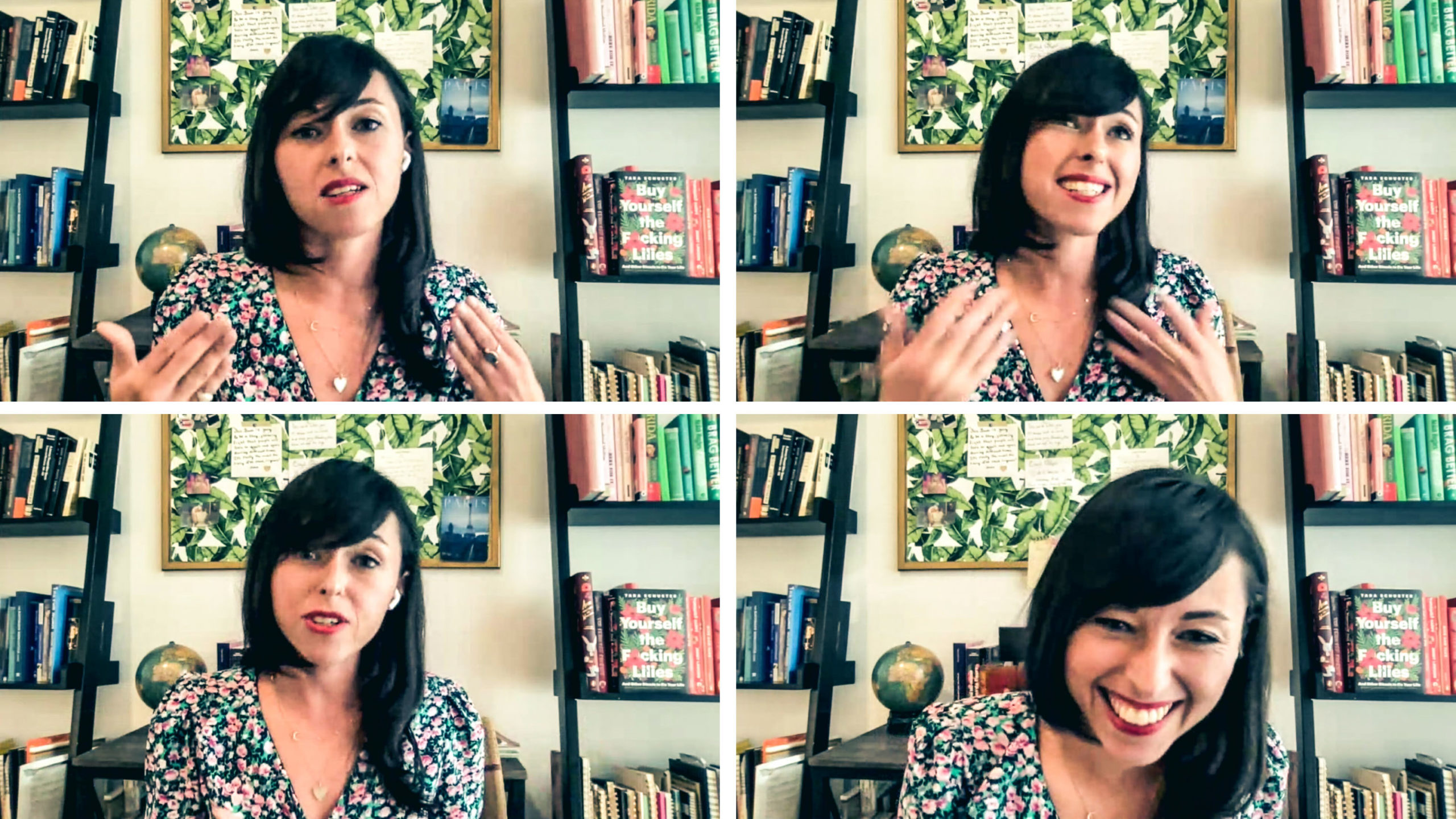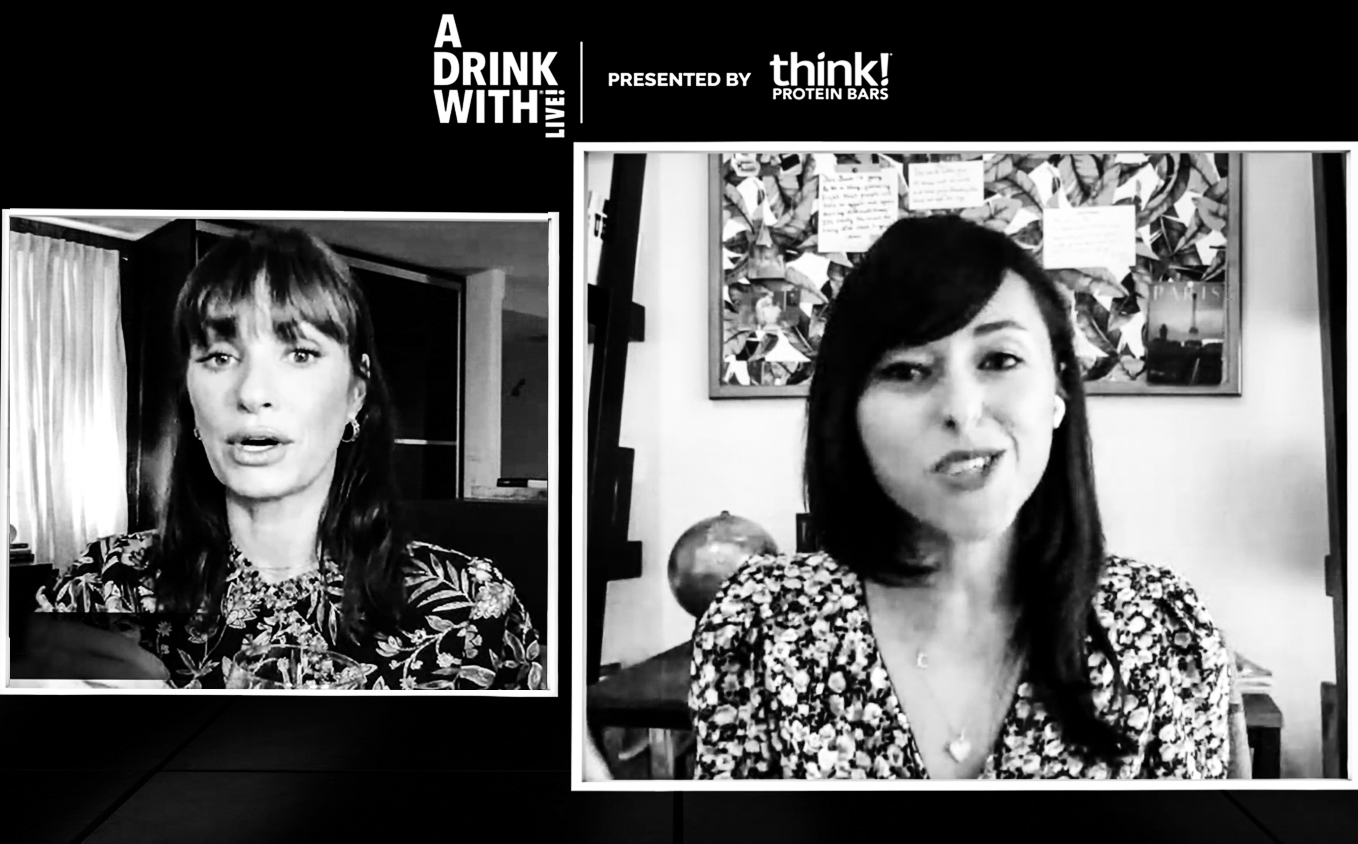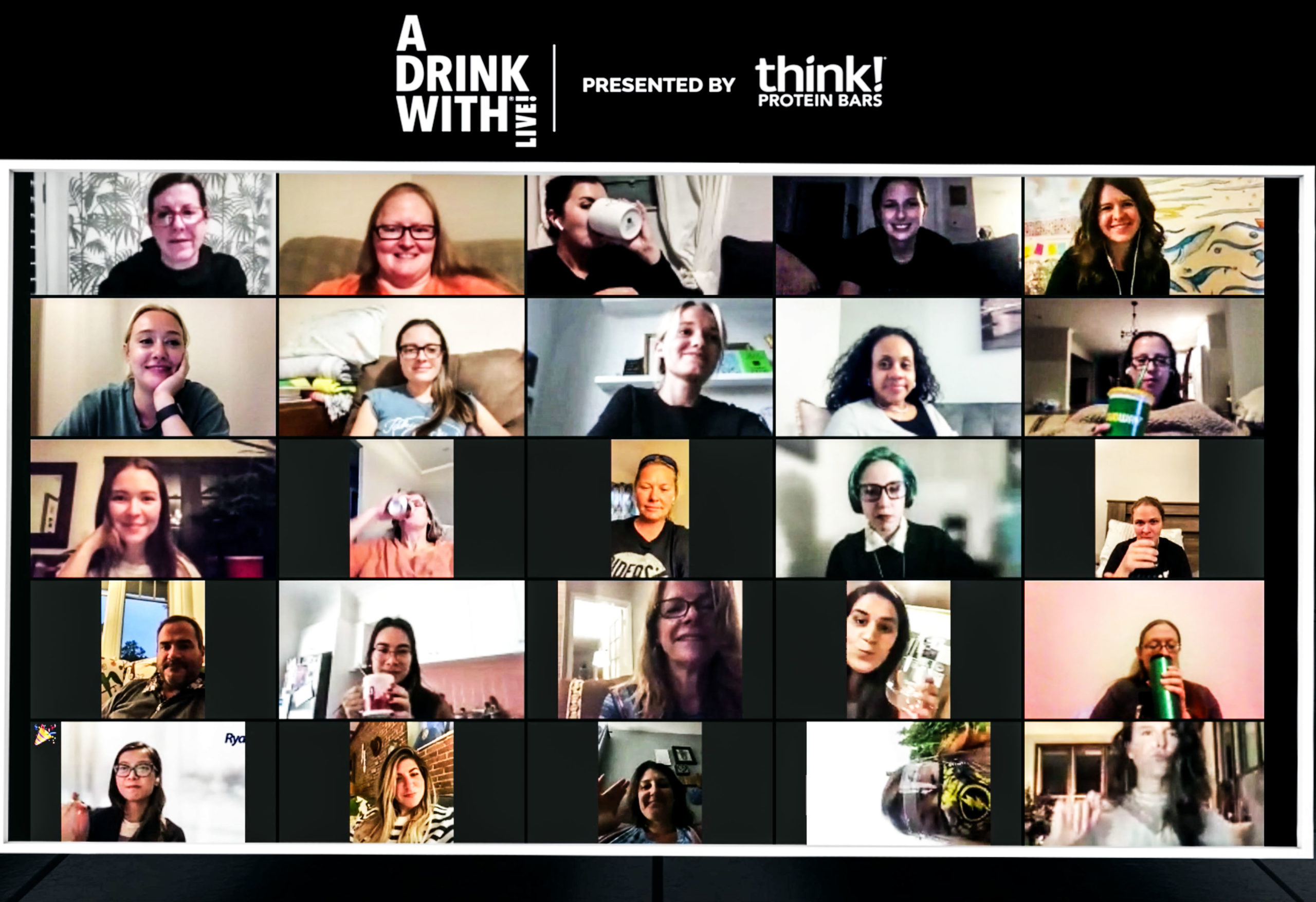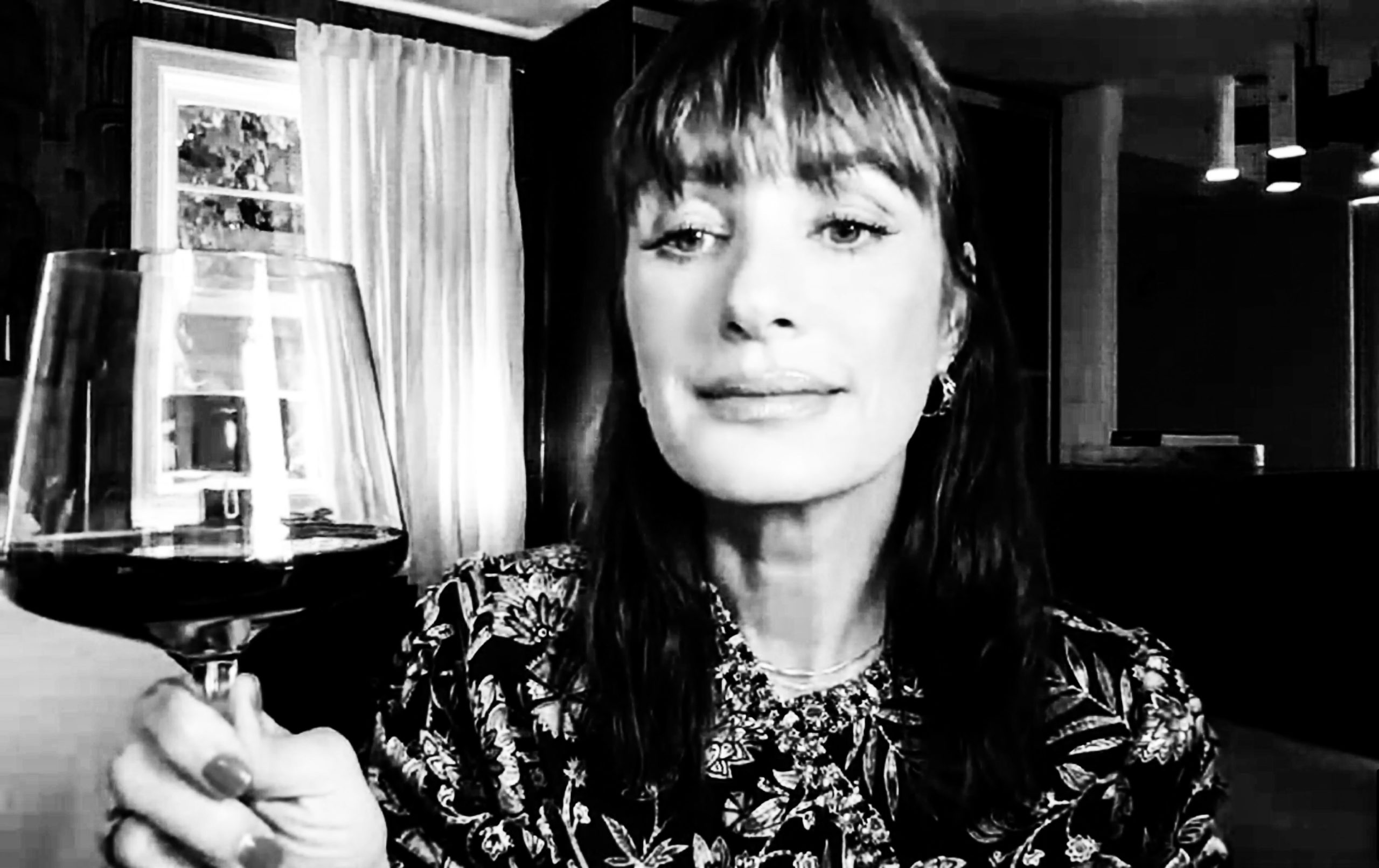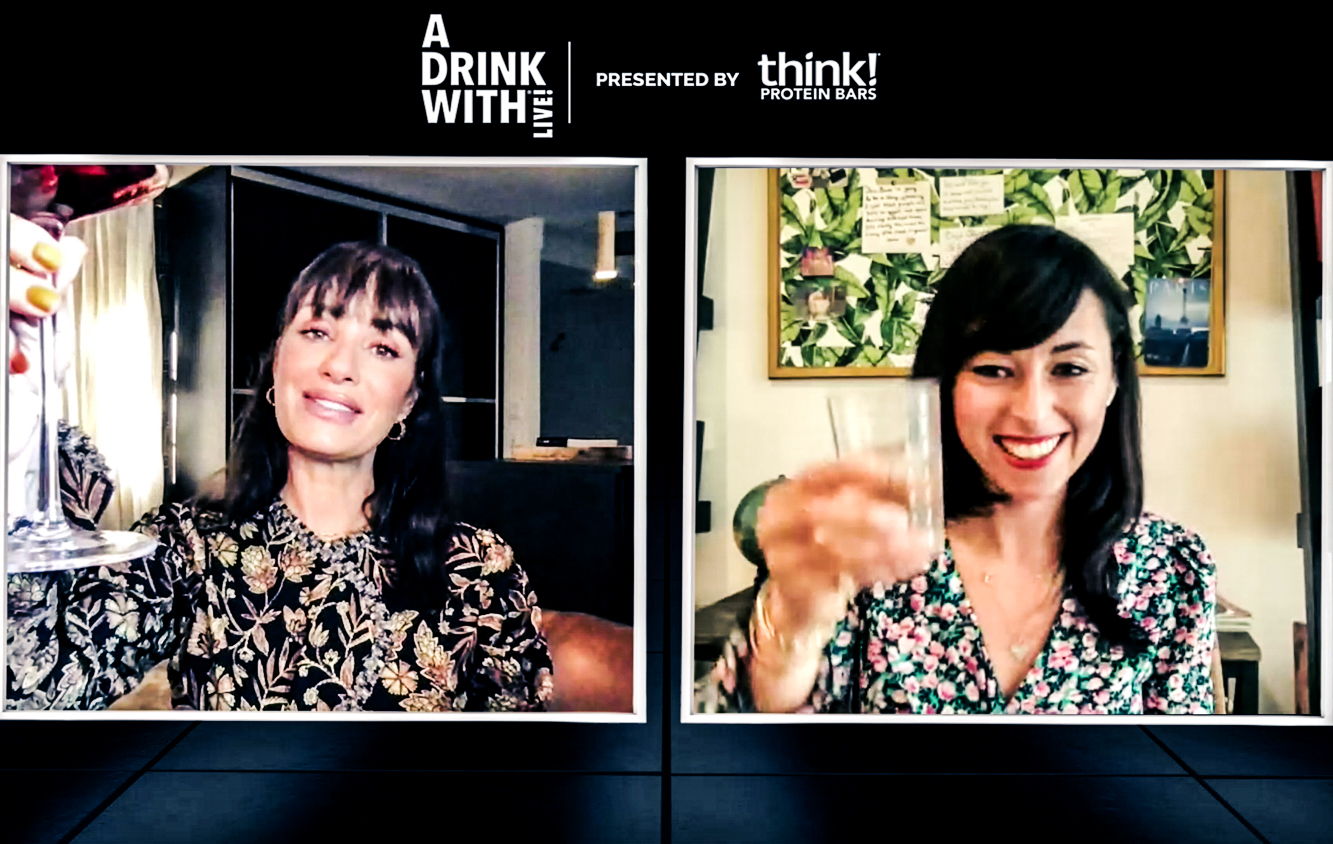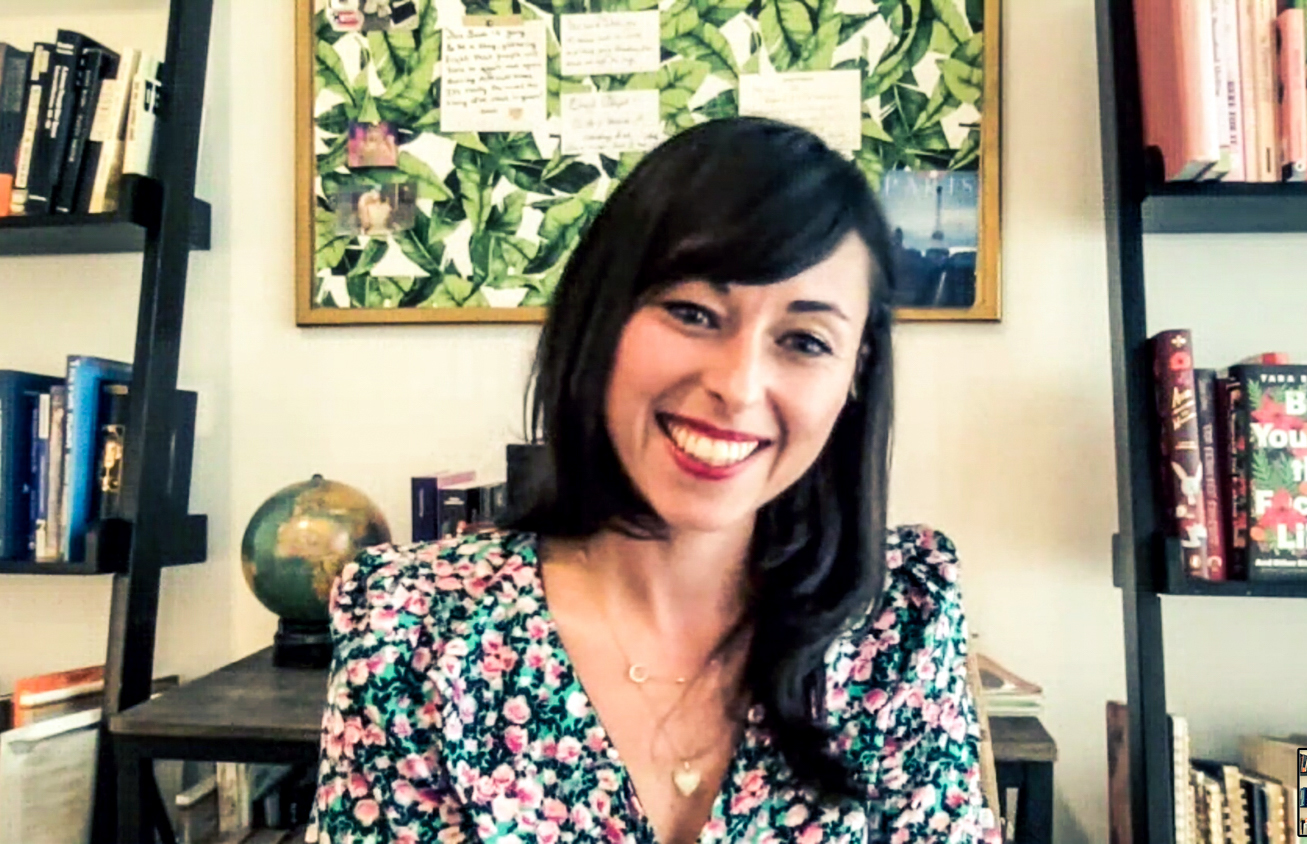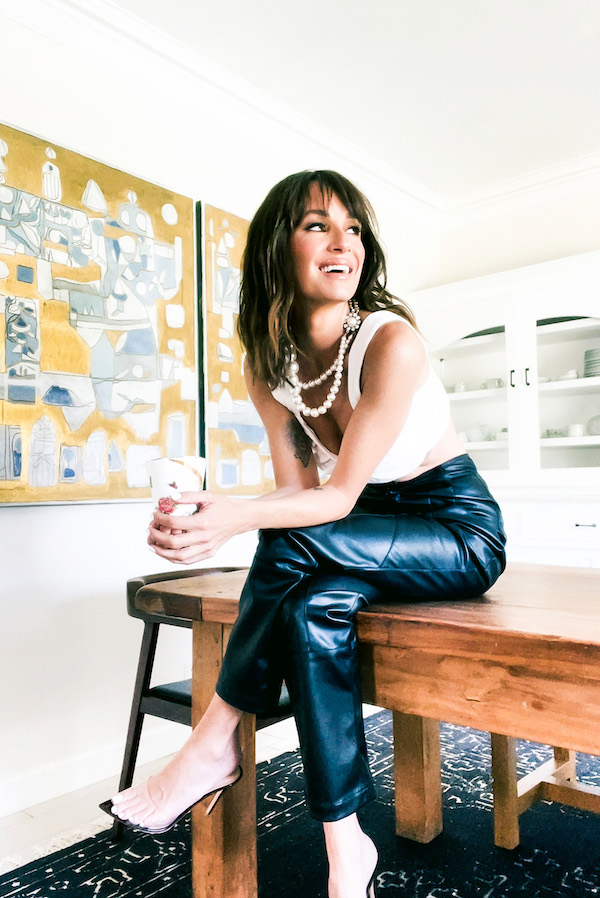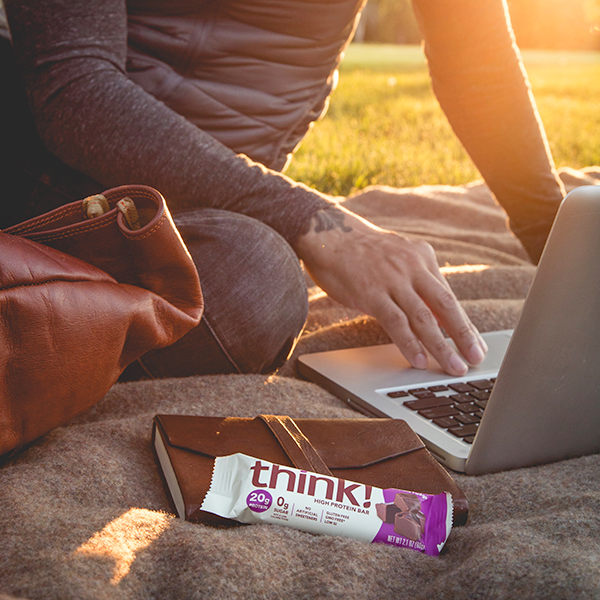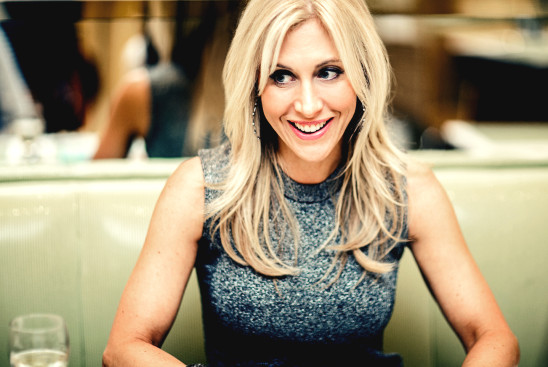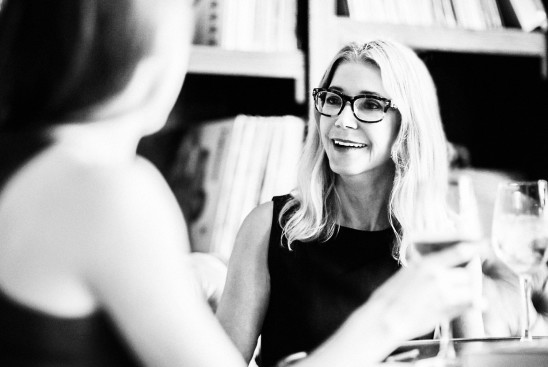I’m drinking a tequila soda. Tequila is my very good friend. We are close. I like a tequila.
Historically, it’s a pretty good thing.
I’m going to take us back to the very beginning of it. I never set out to write a book. I was the VP in Talent and Development at Comedy Central. I was totally in the comedy world. I worked on shows like “Key & Peele” and with David Spade, that was my life. I was very professionally successful, but internally I was having a real struggle. So, I didn’t set out to write a book. I set out to save my life.
I had grown up in a very neglectful, abusive household where things came to die. Like all the pets died, all the plants died, a family of deer wandered into the pool and they died. And it’s not funny, except sometimes I have to laugh because it was so bleak and that’s my only deflection. But my sister and I, we made it out, and we made it out by being so dedicated to school. We were always really good at work. I was always good at presenting as I’ve got it together. Like, “Look at my grades, look at my career.” But internally, that whole time at Comedy Central, I was just imploding.
I’m so sorry if you sat next to me on the one train going Uptown in New York and I was sobbing on you. I was that girl just crying on a stoop, crying in the subway. And I didn’t know where all these emotions were coming from because, in my mind, I shouldn’t have it this bad. I didn’t have the worst childhood ever; I shouldn’t be allowed to be this miserable.
I wasn’t really dealing with it. I never really thought I needed help because my dad was a lawyer and my mom was a doctor. I shouldn’t feel this way.
Many of us go into this mode where we get our worth out of when things look pretty. You were suffering emotionally and mentally. What was the turning point?
I was good at work and bad at life. Anxiety and depression were taking over my life. And I might’ve kept going this way — externally, hustling for my worth, internally, melting down — except that on my 25th birthday, I drunk dialed my therapist and threatened to hurt myself. And the threat was so real that the next morning I woke to all of these voicemails from her. She was trying to find me and she was trying to get me to get help.
I had never worried about myself because, again, I should be fine, right? I present well, I’m starting to get a real salary. But when I heard the worry in her voice, I got worried. That next morning, I thought, “Okay, I never really had parents,” not the kind to nurture you or make you feel unconditional love. I have so many questions like, “What are values? What are principles? What are vegetables? Genuinely, what are they and which ones should I be eating?”
I had all these questions, I had no one to ask. I didn’t have some wise mentor and again, I couldn’t go to my parents. So, I just decided and thought, “What if I treated this as a work project or a school project? What if I made a Google Doc, a curriculum of how to reparent myself, and answered all these questions?” And so, that’s what I started to do. I read the books of Nora Ephron like they were self-help books. When she said you should only have two glasses of wine at dinner, I thought, “That’s a little prudish. Is that real, Nora Ephron?” But I would try it on.
I would try all these different solutions on and I’d write about it. And at the end of five years, I actually had a 600-page Google Doc. I felt like a completely different person, like someone who was healed. And that’s when I realized, “Oh, I have an offering. I have something for anybody who’s been on this road, and I feel compelled to share it. I want to help people the way I wish somebody would have helped me when I started this journey of healing.” So, that’s sort of how the book came about.
To find the purpose out of that, to not just heal yourself, but to heal people everywhere, is incredible, but it can be daunting. What was that feeling like before birthing it?
If I had really thought about it more, it might have been really scary. But I just was like, “I’m going to do it.” If I had been a smarter person, I might have thought more about what the repercussions would be. But I will say, some people in my life said, “Oh, is this going to close the door for you being an executive ever again? Are people going to judge you?”
I finally thought, “If people judge me for being me, someone who survived a neglected, abusive childhood, if you’re going to judge me for that, let’s not work together. I do not want to be a part of your organization.” I’ve used all those things to grow into the person I am now, which I think is an empathetic, compassionate person, who tries to be a good person at work. I only see it as a benefit and I don’t really want to be in an environment that sees that as somehow a judgment against me. So, that’s sort of how I handled it. I just didn’t think it through. And then I thought, “And screw them,” if that’s the case.
For people who have not read your book, “Buy Yourself the F*cking Lilies,” what is the symbolism there?
I really had in my mind that I was not worth anything. That’s what my childhood taught me. My parents were constantly like, “This marriage ruined my life. This divorce is ruining my life. Your education is putting me in debt.” I really thought that I was just not a worthwhile human being. And that would play out in a lot of small ways in my life. In particular, I would be at Trader Joe’s, good old TJs, and I would see lilies, my favorite plant on earth. I love how they just burst open with perfume and elegance and elevate any room they’re in. I’d see them and see that they were $7.99. I’d think, ” I’m not worth that. They’re just going to die. It’s not worthwhile. Those aren’t for me. I don’t deserve it.”
And as I did the work of reparenting, what I came to realize is, those basics are a luxury you must provide yourself. Why else are we here on earth? We’re not just here to grind out work all the time with no enjoyment. We are here, in part, to be grateful for things like lilies, and that denying myself lilies was mean, and there was no reason to be mean to myself anymore. I didn’t need to continue to abuse myself. I didn’t need to keep neglecting myself.
I treat all the small things in my life like the miracles they actually are. We often think, “A trip to Hawaii, my big blowout bachelorette, if I get that, then I’ll be happy.” But I’m saying, “If you make your bed, then you’ll feel better. If you buy the lilies, your day will be more enjoyable.” We get so focused on big picture, but what was your day like? What was your Tuesday like? That’s where we can get so much joy. And so, that’s the message of, “Buy Yourself the F*cking Lilies.”
What are some little exercises that can help people find that peace and overall joy in the day-to-day?
Oftentimes we don’t want to start because it feels really overwhelming. For me, the one that really brings me self-awareness and the most joy consistently is journaling. And I’ve been journaling every day for 10 years. I’m not the first person to say that it’s important. But what I talk about is, it’s like DM-ing with your soul. It’s a really easy way to get in touch with how I actually feel. What’s the truth? Because we don’t really tell the truth a lot of the time. We’re telling versions of the truth to our friends. And maybe even sometimes we’re lying to ourselves a little about our behaviors and our choices. But a journal, just the act of having to write out how you feel, the act of having to check in every day, builds an incredible amount of self-awareness. And self-awareness is always the first step in any self-care or any healing process. Just to know what needs to be healed. So, journaling would be my number one go-to.
And then number two would be exercise, which again, I’m not the first person to say this, but the simple act of sweating, of being in your body, of claiming “I’m here on earth.” Let me use this amazing thing I have. It makes me feel powerful, and like I have some agency. And I am a non-athlete to the core. I ran the mile in saddle shoes and tights in school. No one has ever mistaken me for an athlete. And yet, what I find is that consistently running, walking outside, being in trees, having the sun on me, the returns on that are incredible.
So journaling and having some physical practice are free and available to everyone. I’m not saying you have to go run a triathlon. I’m saying, “Did you walk around the block? Did you do something to be in the world?”
How do we find our tribe? Why is that important?
I think the quality of your friendships, the quality of your relationships, reflects the quality of your life. They reflect what your values and priorities are. And there’s something so special about humans. We get to love. I want to exercise that amazing emotion as much as I can, not only because it’s a positive force for my community, but it feels good when I care about somebody else and I pour care into somebody else. That lights my soul on fire. Friendships are just so important.
And I think as we get older, we say things like, “Well, it’s hard to make friends as an adult. It’s difficult to make friends.” And I want to call BS on that. It’s difficult to be a coal miner. It’s difficult to be on hold with an airline. Reaching out to somebody and saying, “Hey, do you want to hang out?” is not. And actually, I think that’s how we’re friends. I was a guest on your podcast, and we hit it off. And if memory serves correct, I think I emailed you and was just like, “You’re really cool. Do you want to hang out?” It sets me up for rejection, but what was the worst that’s going to happen? You ignored the email or didn’t want to hang? My life would go on. I’ve been through worse. But what was the best-case scenario? The best-case scenario is that I would have a dear friend for the pandemic and beyond, and the best-case scenario happened.
My encouragement to people is always, if you find that you don’t have the tribe you want today, do not worry. I would write out a list of people in your life who are acquaintances or people you know already but want to get to know better, and then ask them to hang. Be a good friend to them. And I would be surprised if you weren’t able to add some people to your tribe.
[Audience Q/A – Michelle] I’m calling from Melbourne, Australia. How has your life changed since writing and publishing “Buy Yourself the F*cking Lilies”?
Well, first off, thank you for calling from the future. Thank you for inviting us into Friday. In America, it’s Thursday. And thank you for reading the book. I’m no longer at Comedy Central because I am pursuing writing full-time now. And I hope to have some very exciting things to share publicly. I feel like I’ve really found the thing that I love to do. And what I love to do is connect with you, tell stories and get feedback. Hopefully, this road is going to be a good one.
[Audience Q/A – Samantha] In the context of functioning as a normal human with a job and other things, how do you recommend making time for these large re-parenting tasks?
It’s such a great question. And thank you for being a part of Team Lilies and subscribing to the newsletter and emailing with me. I’m going to say two things, the first thing is that we should not use self-care against ourselves. We’re hypercritical, especially as women, and anything we do wrong is another reason to be like, “Oh my God, I didn’t do yoga today. What is wrong with me? I know that yoga works. And da da da…” No, honey. We are not going to beat ourselves up because we missed a good habit. I can’t stand that. So the first thing is, healing is difficult. Taking care of yourself in a society that is against us taking care of ourselves is hard. So, we recognize that. And when we miss something that we know would feel good, we just say, “It’s okay, sweetheart, I’m going to come back to this. Tomorrow, I’m going to try again.”
And the second thing I’d say is if you find yourself missing your morning routine every day for two weeks say, “I love you very much,” but you got to ask, is it a priority? Is this self-care thing actually a priority? And if you want it to be, then you have to make it a priority. And you might need to wake up a little earlier or readjust other parts of your life to make it happen.
So, we’re never going to beat ourselves up for missing self-care. And on the other hand, we’re going to do everything in our power to make it a part of our lives and not let ourselves totally off the hook when it’s a habit we want to establish. And so, good luck to you. I’m so glad that you’re on this path.
[Audience Q/A – Kat] Your book has certainly changed my life in so many ways. With your increasing popularity, how have you seen your personal relationships change, both positively and negatively?
I think my friendships haven’t really changed. Relationships haven’t changed, I have changed. The book has forced me to be more myself and to have more boundaries, because if I’m going to be the one here saying all of this, then I got to walk the walk for real.
And so, in some of my family relationships, there is someone in my family who is dear to me who I’m not speaking to right now because, historically, they keep doing the same things over and over again. And I realized, unless I put up a boundary, they’ve got no reason to change.
The book has just forced me to be more myself and to go after friendships I really want. And to not accept behavior that makes me feel diminished and bad. But no jealousy that I’m aware of. I think my lady harem and everybody in my inner orbit have mostly been supportive and great.
And then I have Team Lilies. Knock on wood, but people don’t really troll me. I think if you’re into the book, you’re a pretty optimistic person who wants to see positive change in the world. It’s a nice, self-selecting group and I just find it so supportive
[Audience Q/A – Rachel] How did you come up with all of your tools?
I think in my case my God-given gift, something I never asked for, is that I’m a sponge. I’m like a curious sponge. I’m always thinking, “How do I do that? How could this be improved?” I’m always problem-solving.
And it probably comes from my childhood of being pretty much on my own, of having to problem solve a lot. It’s just a natural thing about me. When I was approaching this whole project of reparenting myself, I just started asking questions and then following the questions.
I literally just Googled things. In the book, I write about how I would just Google, “What are principles? Which one should I have?” It wasn’t like I had some master plan. It’s about being curious about yourself. And then, committing to finding out the answer and just experimenting with it.
